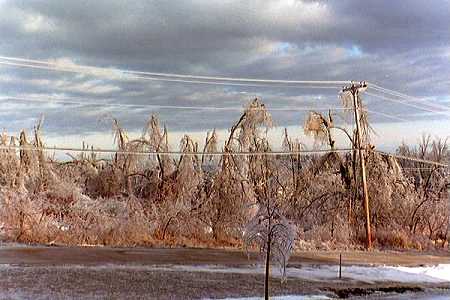2023 isn’t over yet but it certainly brought the climate change crisis, now clearly an emergency, into focus. The long list of climate change tragedies grows by the day. Record wildfires across the country from coast to coast, record July temperatures, record ocean temperatures, flooding, tornadoes, hurricanes and the year has four more months to go!
As we watch these events unfold, it is human nature to think well, yes, those things are terrible, but it will pass. those tragedies are faraway places, “it won’t happen here.”
History tells us we are not safe from climate change tragedies right here in Ontario. It’s very likely the ice storm we experienced in 1998 will happen again. Winter is coming. Is Ontario prepared for another such storm? In the ice storm in 1998, 28 people died most from hypothermia, 945 people were injured. Over four million people in Ontario, Quebec and New Brunswick lost power. About 600,000 people at severe risk to their safety had to leave their homes to find safe shelter. The total financial damage was estimated at $5.4 billion.
There are many similarities between Ontario and Texas which had its own climate crisis tragedy in February 2021. A tragedy made much worse by human greed. Ironically, Texas implemented its deregulated electricity market in 2002, the same year that Ontario’s deregulated electricity market was implemented. Electricity markets are notoriously easy to manipulate. Disconnecting Texas from the national grid to ensure a higher market price, made the crisis there much worse.
Ten million people lost power that February, many for more than two weeks and more than 210 people died. The cost was over $195 billion, not to mention the cost of human suffering.
Electricity affects every aspect of our lives. A lengthy power disruption is a very serious threat to life. It was very clear to see that private ownership, deregulation and greed played a major role in the disaster in Texas. Governor Greg Abbott was warned years ago, but protecting profits was much more important to him than fixing the problem. Premier Doug Ford is acting the same way as he is doing everything, he can to protect profits in the hydro sector here by spending billions of our money on his electricity rate subsidies to the tune of almost $7 billion a year of our money, artificially lowering artificially high rates, hiding and protecting the hydro deregulation failure.
There are questions that need to be asked about Ontario’s severe storm planning.
Does Ontario have an emergency plan for another ice storm or other climate created power outages? If not, why not?
Why didn’t Ontario harden its electricity grid after the ice Storm of 1998 the way Qυebec did?
Given the downsizing that occurred under deregulation to maximize profits, does Ontario have enough trained and experienced tradespeople and the tools, trucks and equipment that go with them to deal with such an event? With the training of trades apprentices severely lacking over the last 20 years also to save money, this is also a serious question.
Does Ontario have an emergency stockpile of hydro materials and equipment like transformers, switches, insulators and all the different types of wire and cable, connectors and hardware needed to get the power back on?
In the ice storm of ’98, we spent the better part of many days digging those materials and equipment out of the ice and snow to get the power back on because that material and equipment wasn’t available. When time is critical to save lives and keep people safe, you really don’t want to spend a lot of valuable time doing that. Having an available stockpile of hydro materials and equipment is critical to getting the power back on as quickly as possible.
Hydro deregulation has caused rates to spike exactly like Texas. What has it done to system reliability, safety and the ability to respond in an emergency?
With the climate emergency accelerating the responsible thing to do is have a plan and prepare. Being reactive when another ice storm hits, is too late.
Is it profits before people?
The Provincial government needs to answer these questions, because we certainly don’t want Ontario to be added to the list of climate change tragedies.



